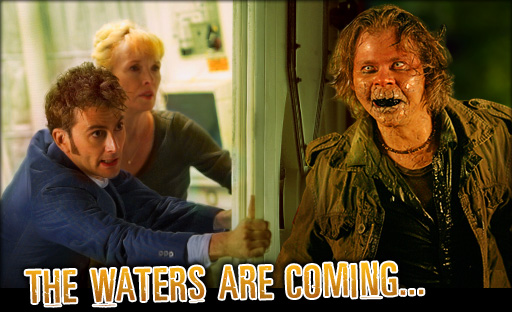
Aired 15 November 2009
Publicity for Doctor Who often touts an upcoming episode as being the scariest yet, or at the very least one of the scariest yet, and while scary is a subjective term to use depending on the target audience, ‘The Waters of Mars’ certainly lives up to its hype as one of the most chilling and unsettling stories in the programme’s long run and without question lives up to the expectations that an episode billed as a special carries with it.
‘The Waters of Mars’ also directly confronts the Doctor’s morality, showing how absolutely terrifying and powerful he can be and suggesting that perhaps it truly is time for this particular incarnation to leave. These are issues that have been casually flirted with in several episodes since the programme relaunched in 2005, but they take centre stage here, showcasing the heroic man who makes lives better as a force of nature full of hubris who will let nothing get in his way to get what he wants. ‘The waters of Mars’ takes away any and all ambiguity regarding the Doctor’s darker side, showing just how truly terrifying he can become when hurt and left alone. Yet, and this a testament both to the acting and to the scripts dating back to Tennant’s debut, this never seems out of character for the Tenth Doctor or like a convenience for the character; this is simply a facet that has been hinted at brought to the forefront very realistically.
Whether this was the intent or not, ‘The Waters of Mars’ pairs quite nicely with ‘The Fires of Pompeii,’ the former taking place in the future and featuring water and the latter taking place in the past and featuring fire with both featuring a fixed point in time where the Doctor knows he should not interfere. Of course, the Doctor decides not to heed his own warning in ‘The Waters of Mars,’ and the futuristic setting obviously allows for a greater degree of freedom in writing and creativity with that result. The accident at Bowie Base One inspires mankind’s continued journeys out into the universe, and logically interfering with events and saving those who should have died to serve as that inspiration could easily change a massive amount of events and ripple effects.
The inclusion of a fixed point in the story is generally well done and, even if the Doctor can’t fully explain what a fixed point means and what the consequences of changing it are, it serves as the crux of a story in which the Tenth Doctor must finally accept that rules cannot be broken on a whim. The underlying theme of the Doctor slowly accepting that his time has come and that he must accept it helps to add an ominous and foreboding tension to events. Having water be the main foe of the piece, a foe that can win simply by waiting, adds a nice parallel to the Doctor’s personal enemy of time itself.
Of course, Adelaide serves as a parallel for the Doctor as well, initially stubborn in accepting that her death is preordained but consoled at least marginally by the fact that she will be remembered and help to form the future. It’s here, though, that Tennant embraces the power-hungry side of the Time Lord, finally accepting that the other Time Lords are gone and that there’s nobody who can threaten him, the moment when his hubris reaches its extreme. Just as the Doctor has implied that the Time Lords became something altogether more terrifying when forced with destruction, the Tenth Doctor himself becomes a terrifying presence as the weight of impending regeneration closes in on him, abusing his position and power to try to prolong his life. The Time Lord Victorious, as he calls himself, is a frightening prospect, and brings him more in line with the Master than he’s ever been, showing just how thin the line between good and bad- regardless of the intention of saving lives- can be. The shocking turn of events as Adelaide commits suicide to save some semblance of the timeline is a striking visual that shows just how far over the line the Doctor has finally gone and helps to bring him out of his delusion even if it does seem a bit too dramatic and convenient for the character’s end.
The crew of Bowie Base One is bolstered by strong performances and writing even if the individuals fit into convenient stereotypes. Lindsay Duncan is superb as the tough-as-nails and take-no-prisoners commander Adelaide and rightfully fills the companion void for the story, unafraid to stand up to the Doctor when needed. Peter O’Brien as Ed Gold has a heroic moment of sacrifice when called into action and Sharon Duncan Brewster is shockingly believable with her terrified screams as Maggie. Gemma Chan’s Mia, Cosima Shaw’s Steffi, and Aleksander Mikic’s Yuri are all quite strong as well.
‘The Waters of Mars’ is easily deserving of its special status, bolstered by strong performances, a gradual acceptance of the inevitability of regeneration by the Tenth Doctor, and a superbly subtle threat from the water that gradually finds its way into the base. The Doctor has shown a callous disregard for the rules and thrown the entire fabric of the programme into flux, and that should make for an intriguing storyline as the two-part finale to David Tennant’s tenure quickly approaches.


November 27, 2020
[…] Gallifreyan Ramblings; The M0vie Blog; Demons Run; Spiralbound Notebooks; Tapetrade; Review The Who; Time Lord Archives; Junkyard View; Lyratek; Random Whoness; Who In Review; Doctor Who Reviews. […]